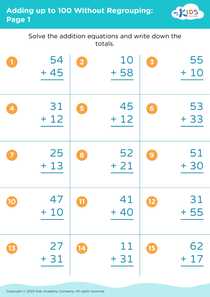Fine Motor Skills Adding up to 100 with Regrouping Worksheets for Ages 5-8
3 filtered results
-
From - To
Enhance your child’s math and fine motor skills with our engaging "Adding up to 100 with Regrouping" worksheets, designed for ages 5-8. These printables offer a fun and interactive way to grasp essential math concepts, while also improving precise hand movements through coloring, tracing, and writing activities. With each worksheet, children practice regrouping techniques and refine their number sense, setting a strong foundation for future learning. Perfect for classroom or home use, this collection makes math practice enjoyable and seamlessly integrates skill-building exercises. Explore and download these valuable resources to enrich your child’s educational journey today!
Fine motor skills are essential for young children's overall development and success in performing everyday activities. The significance of tasks like adding up to 100 with regrouping cannot be understated for ages 5-8 as these exercises foster these vital skills. Fine motor skills involve the coordination of small muscles in the hands and fingers, critical not only in academic tasks like writing but also in routine activities such as buttoning clothes or tying shoelaces.
Adding up to 100 with regrouping challenges children to use their hands and fingers to manipulate objects or write numbers, directly enhancing their fine motor abilities. This hands-on practice builds muscle strength and improves hand-eye coordination, essential for more complex tasks. Additionally, mastering these math skills at a young age lays a cornerstone for future arithmetic competencies.
Moreover, through math activities that require precision, children learn problem-solving skills and perseverance. These tasks encourage cognitive development, critical thinking, and the ability to focus attention for longer periods—aiding success in various academic areas beyond mathematics.
By integrating such exercises, parents and teachers not only bolster mathematical understanding but also contribute significantly to the child's motor and cognitive development, ensuring they are well-rounded and equipped for future challenges.



















